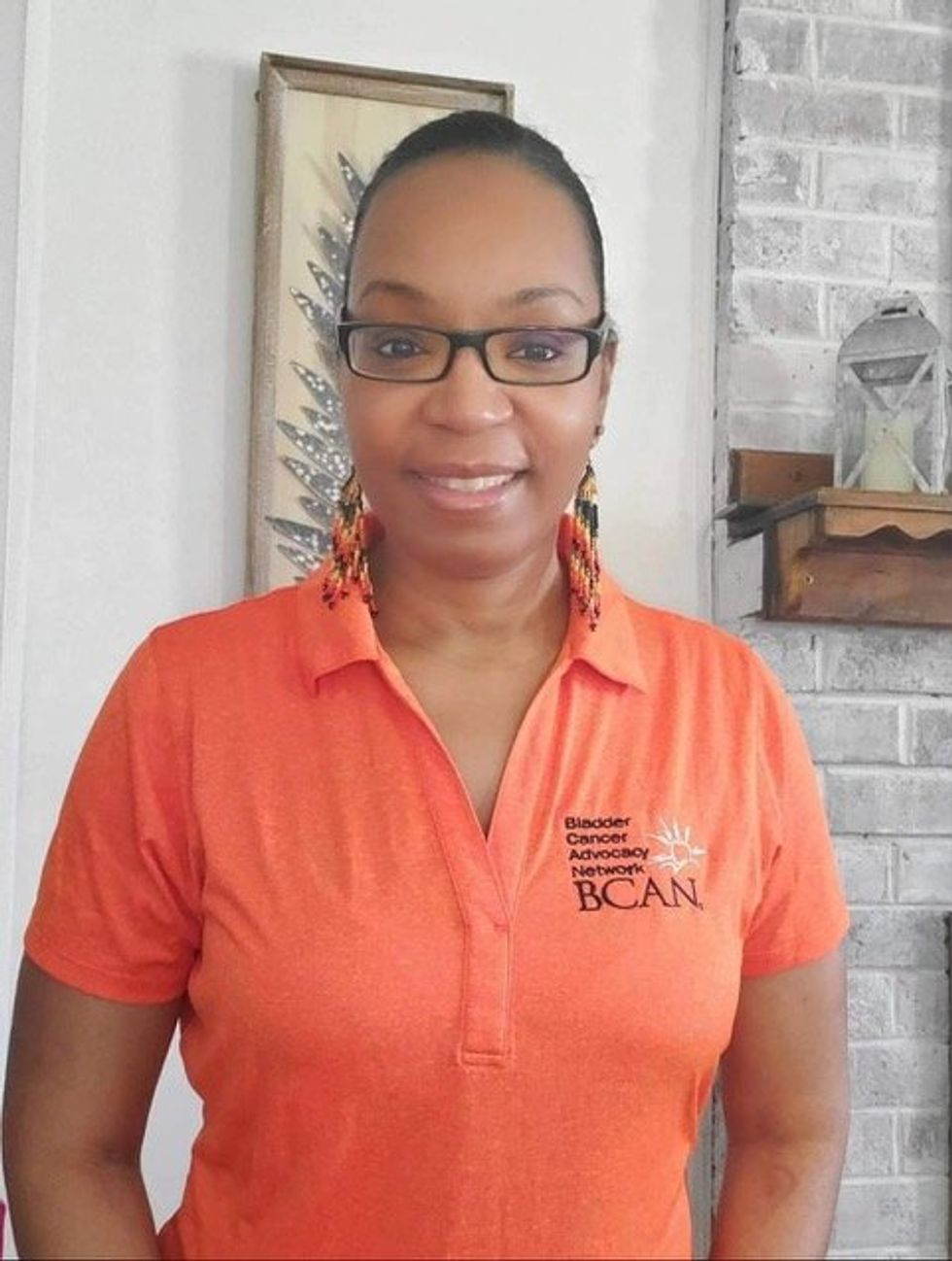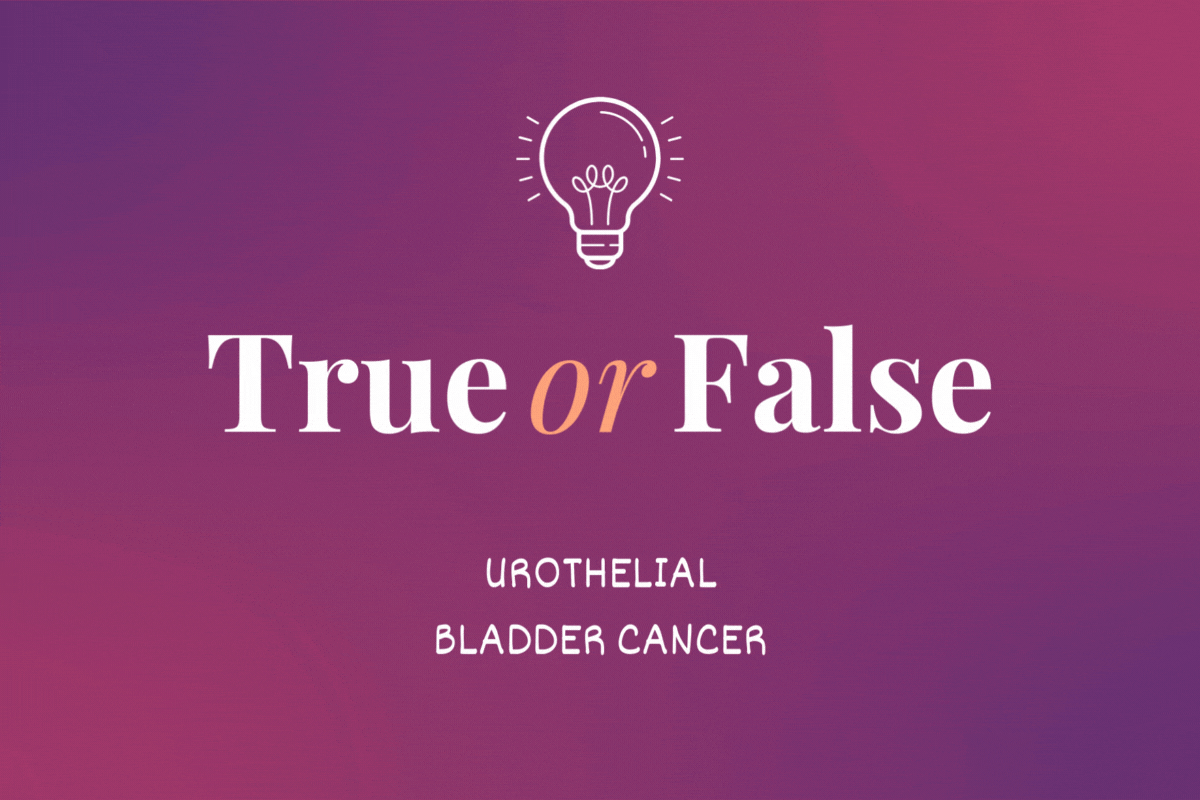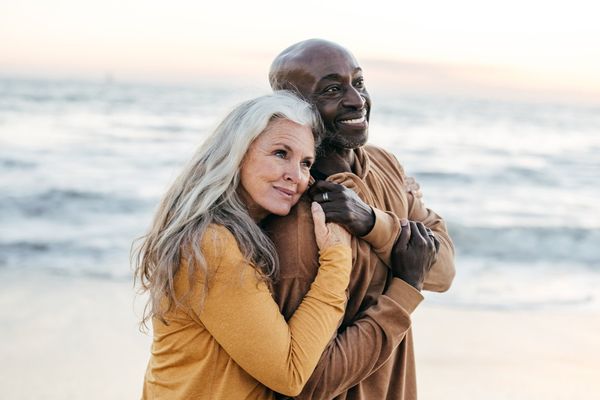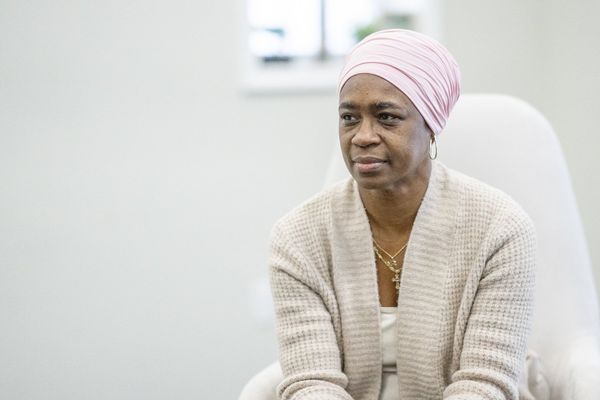Monica Austin-Cox remembers well the day a routine pelvic exam changed her life forever.
Her gynecologist felt a lump that was initially believed to be related to Austin-Cox’s ovaries. But further testing revealed it was actually a mass in her bladder.
She was quickly referred to a urologist, who performed a cystoscopy, a procedure that involves examining the inside of the bladder with a camera. The results confirmed her worst fears — Austin-Cox had bladder cancer.
The news was shocking: “I had never heard of bladder cancer,” said Austin-Cox, who was 30 at the time of her diagnosis and had never been a cigarette smoker but had been exposed to secondhand smoke much of her life. “The signs and symptoms, like blood in the urine, were things I had experienced, but I had attributed it to the repeated urinary tract infections (UTIs) I’d been getting. I’d always taken the antibiotics prescribed by my doctor and they would just go away. So, I thought nothing much of it.”
Read: Living with Bladder Cancer >>
Her cancer was quickly diagnosed as stage 1, non-muscle invasive, an aggressive form of cancer that required close monitoring and repeated treatments. Over the next four years, Austin-Cox found herself in a nightmarish medical battle that included having surgery to remove the mass in her bladder and follow-up cystoscopies every three months. Each time, she’d learn that the cancer had returned.
“There was constant anxiety of wondering if the cancer would come back,” she recalled of the all-too-brief periods in between her checkups. “It was overwhelming.”
How bladder cancer differs for Black women

Monica Austin-Cox in an undated photo. (Photo/Monica Austin-Cox)
Adding to Austin-Cox’s anguish, she found little in terms of support groups and resources available for women battling bladder cancer, especially for Black women like her, near where she lived in North Chesterfield, Virginia. And she wasn’t able to find much information on the internet about how women experience the disease either. “It’s not just ‘a white man’s disease,’” she said, referring to a widespread myth. “Black women get bladder cancer too and we deserve the support and resources we need to fight this horrible disease.”
Men are more likely to develop bladder cancer than women and white people are about twice as likely to develop bladder cancer as Black and Hispanic people. However, a growing body of research confirms that Black women are battling the disease more and more, and they are often being diagnosed at later stages, facing poorer outcomes as a result.
Studies have also found:
- Black women have the highest proportion of advanced and aggressive tumors when compared to Black men and white men and women.
- Compared to white women, Black women make up a larger percentage of bladder cancer incidence and face disparities in treatment, regardless of insurance status, education, the presence of other health conditions at diagnosis or the stage when the disease is found.
- Black women with bladder cancer tend to be at higher risk for the cancer cells spreading from the bladder into their bones.
Houston researcher Heather Honoré Goltz, Ph.D., an expert in cancer survivorship and disparities, a licensed clinical social worker, and a professor of social work at the University of Houston-Downtown, said women are often misdiagnosed, partly due to symptoms like frequent urination or blood in the urine being mistaken for menopause or UTIs, like Austin-Cox experienced. According to Goltz, Black women often face elevated risks for the disease related to exposure to harmful chemicals in certain professions, such as exposure to hair dyes while working as a hairdresser, environmental toxins where they live and the long-term effects of smoking, a leading cause of bladder cancer.
“Like your liver, the job of your kidneys is to filter harmful toxins from your bloodstream and move them into your bladder,” explained Goltz. “That’s why being exposed to certain chemicals may increase a person’s risk for bladder cancer.”
She attributes the poorer outcomes Black women with bladder cancer face to long-standing issues of bias within the healthcare industry. “A significant problem is the way healthcare systems interact with women, particularly Black women,” said Goltz, noting that studies show that even with health insurance, private and public, Black patients tend to receive lower quality of care compared to their white counterparts.
“There’s an assumption that if you have access to quality care, that you're going to receive the gold standard of care, but that's not always true. What we're finding is that a large percentage of Black patients, and particularly Black women, aren’t getting the highest standard of care.”
Read: Why Sex and Race Matter More in Bladder Cancer Treatment >>
Steps Black women with bladder cancer can take for a better prognosis
Self-advocacy is vital in detecting and diagnosing bladder cancer in the earlier stages, when it’s more treatable.
“Be vigilant about any changes you’re experiencing in your body and any concerning symptoms, such as painful urination or frequent urination,” Goltz said. “Don’t automatically dismiss it as related to aging or menopause. Discuss your symptoms with your primary care doctor and request follow-up testing or even a referral to a urologist to be sure.”
Austin-Cox can relate to the quality of care concerns Goltz raised. Early in her diagnosis, she felt dismissed and neglected by her urologist, including receiving repeated requests from his office to reschedule follow-up exams, despite the severity of her case.
“The nurse would call and say, ‘He’s not going to be able to see you this week, would you like to reschedule?’” And I was like, ‘No, because the cancer keeps coming back,’” she recalled.
Frustrated, she eventually took control of her healthcare and sought a new urologist who provided more attentive care and initiated a more aggressive treatment, marking a turning point in her treatment. “Never be afraid to advocate for yourself,” she said.
Five years after her diagnosis, Austin-Cox was declared cancer-free. Now she visits with her urologist annually to check for any signs of the disease.
As for the lack of support and resources available for women battling bladder cancer, Austin-Cox, now 50, said that has improved slightly in the two decades since her diagnosis, but there’s still a great need today. She is grateful for a supportive husband, family and friends who helped her through her cancer journey. To this day, she pays it forward to others by volunteering and participating in advocacy efforts with the Bethesda, Maryland–based, Bladder Cancer Advocacy Network (BCAN).
Added Austin-Cox, “We all have to do our part to raise awareness about the fact that women do get bladder cancer — and our lives matter too.”
This educational resource was created with support from Daiichi Sankyo and Merck.
- Going Back to Work with Bladder Cancer ›
- Good Nutrition Before and During Bladder Cancer Treatment ›
- FAQs About Reproductive Health and Bladder Cancer ›
- Life with Urothelial Bladder Cancer ›
- Fast Facts: Everything You Need to Know About Urothelial Bladder Cancer ›
- Why Sex and Race Matter in Bladder Cancer Treatment ›
- How to Regain Intimacy When Your Partner Has Bladder Cancer - HealthyWomen ›
- Cómo recuperar la intimidad cuando tu pareja tiene cáncer de vejiga - HealthyWomen ›






